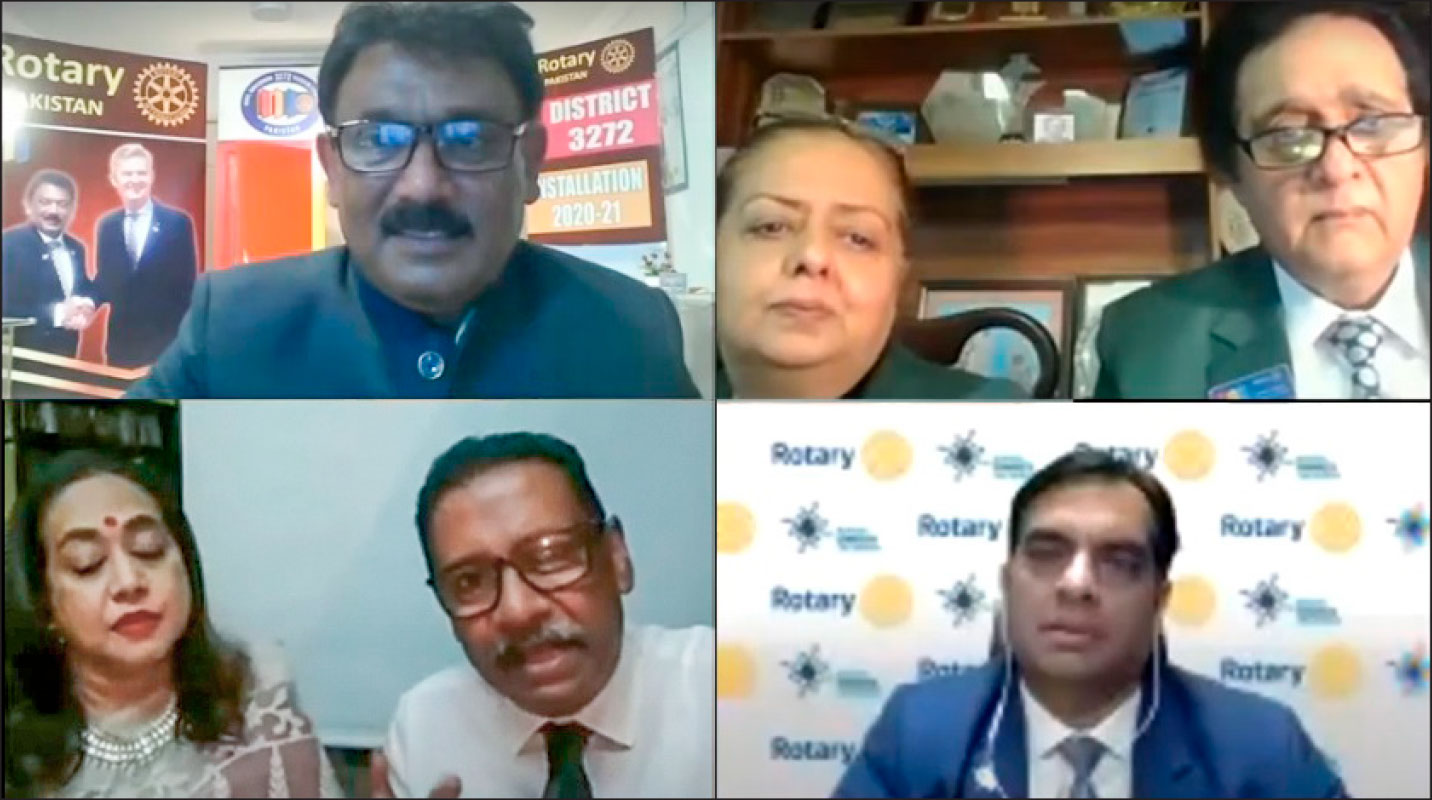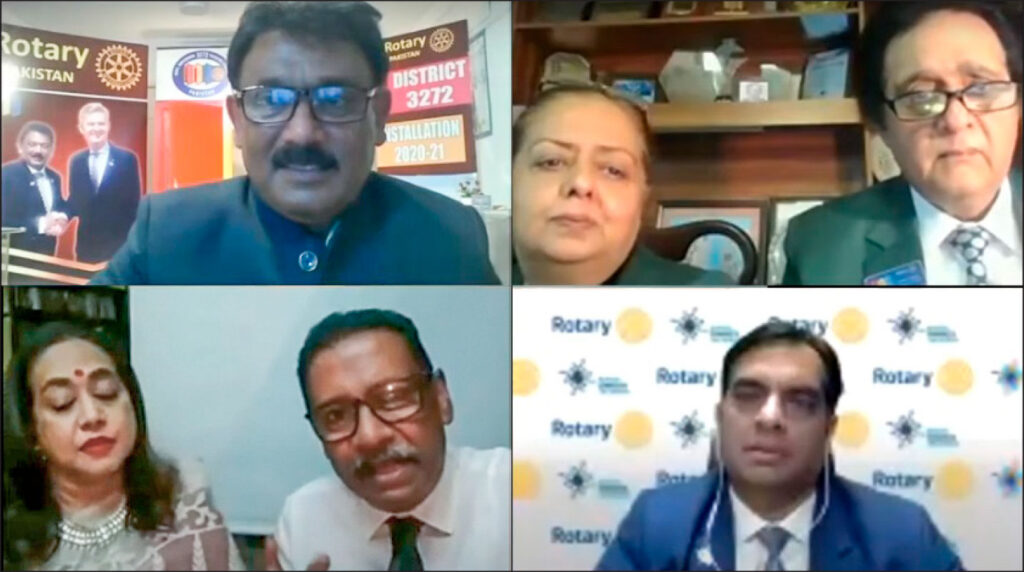Giving a big push to India-Pakistan relations at the non-governmental level, Rtn Ravishankar Dakoju from RC Bangalore Orchards, RID 3190, who has donated ₹100-crore to TRF, announced four joint programmes that will promote fellowship and cultural bonding with Rotarians from our neighbouring country. Delivering his speech on Borderless World and Peace at a webinar hosted by RID 3272, Pakistan, he called for Rotarians to come together for a “peaceful planet by connecting the world instead of spending huge money on defence when it can be used for better education, healthcare and infrastructure.”

“DG Nagendra Prasad and IPDG Dr Sameer Hariani are leading me in my cross-border initiatives. I am assisted by my Rotary mentor PDG Suresh Hari, who is coordinating with PDG Mir Arif Ali from RID 3272,” said Dakoju.
On Dakoju’s suggestion to help TRF get more PHFs from Pakistan by donating points accumulated in RID 3190, PDG Suresh Hari agreed to donate points from his and his friends’ personal accounts totalling 100,000. These points can be used as matching contribution for Rotarians in RID 3272 to become PHFs, through part giving and part point transfer. “This gesture will establish a wonderful bond between the two countries, and strengthen both TRF and Rotary brotherhood,” said Dakoju.
Also, from the Paola Dakoju Ravishankar Foundation a sum of $10,000 will be donated to RID 3272 for the purchase of 100 mobile carts for selling fruits and vegetables to help Covid-affected families in Lahore and surrounding areas. “Arif Ali has prepared the list of beneficiaries and this programme will help those who have lost their jobs or are struggling due to the Covid impact,” he said.
Thirdly, his district team is making efforts to extend the stay at Gurdwara Darbar Sahib in Kartarpur for Indian pilgrims in the morning and evening, so that “Rotarians have an opportunity to interact more with their counterparts in Pakistan.” At present, there are restrictions in the number of Indian pilgrims visiting the Sikh temple in a day and they are allowed to stay there only for specified hours.
A Rotary peace rally is slated on October 24 to proceed from Bengaluru to Amritsar and then reach the border for exchanging flags and ideas with Pakistani Rotarians. DG Prasad is coordinating with RID 3272 and also Indian officials for undertaking the peace rally without any hitch. Recalling his boyhood days, Ravishankar said, “I used to sleep when other students were taking notes in the class and failed in Class 10 exams three times, before passing with a bare minimum of 32 per cent.”
But he used to dream big, “I even dreamt of climbing Mount Everest, but ended up climbing a mountain. But I see many people on foothills as they don’t have the ability to dream big. Without dreaming, I would be a dead man.”
In a way, what Zakat does for Muslims, the Rotary Foundation does for Rotarians, by urging them to give a small percentage of their wealth for community welfare projects.
For Ravishankar, religion is “something very personal and though born a Hindu, I married Paola Rodriguez, a Roman Catholic, and feel blessed. I pray to God that I can marry her in my next birth too.” His philosophy is Sarva dharma samanatva (give respect to all religions) as “I live in a multireligious house and till now, there is no argument or fight among us. On the contrary, we enjoy celebrating different festivals.” Citing Vinoba Bhave, he said the concept of nation states is outdated as “we will be moving towards a borderless state.” He decried the huge amount of spending on defence, “around 15.5 per cent of our GDP, when resources are scarce,” and can be better used for improving our living conditions. “I feel ashamed that in the name of country, we fight and kill each other. Is this civilisation, when we are no better than animals?”
Zakat, the father of CSR
While India passed the CSR Act in April 2014 and Pakistan followed suit in May 2017, making it compulsory for companies to allot at least two per cent of their annual profits to charity and philanthropic activities, Zakat, a 1,400 year-old edict in Islam, orders Muslims to donate 2.5 per cent of their annual wealth for noble causes. “This Zakat obligation purifies the heart and soul and has socio-economic benefits for mankind,” said Ravishankar. In a way, what Zakat does for Muslims, the Rotary Foundation does for Rotarians, by urging them to give a small percentage of their wealth for community welfare projects, he said.
Rotary SAARC webinar
At the peace webinar on the topic ‘United South Asia for better future’ hosted by RC Aurangabad Metro, RID 3132, DG Harish Motwani called upon Rotary leaders “to develop a system for countries in this region to come together at the non-governmental level.” With over 1.75 lakh Rotarians from 4,850 clubs and having large resources and knowledge, “we can change the entire scenario in South Asia,” he said. With polio almost being eradicated, people have developed faith in Rotary and “this SAARC peace conference fulfils one of the main objectives of International Service of Rotary, that is, peace building and conflict resolution.”
He emphasised taking up RYE, New Generation Service Exchange and Rotary Friendship Exchange among SAARC countries to promote mutual trust and goodwill. DG Dr Farhan Essa Abdullah, RID 3271, said “there is a need to clear the misconceptions about Pakistan as we are peace-loving people and I invite Rotarians to stay as our guests, enjoy our hospitality and take back fond memories of your stay here.”
Regional cooperation, trade and medical exchange programmes will build bridges of friendship and trust among South Asian neighbours, said Abdullah.
PDG George Jesuthasan, RID 3220, from Sri Lanka, said the 1.8 billion people from South Asia, constituting 23 per cent of world population, have only 4.3 per cent of global GDP. “Since independence, the countries are beset with different kinds of conflict, either at war with each other, civil strife or community unrest due to religion, caste or ethnicity,” he said.
Addressing the meet, PDGs Tirtha Man Sakya and Keshav Kunwar, RID 3292, stressed on the need for South Asians to promote global peace through cultural exchange and mutual cooperation. “We need an understanding to implement giant community projects that will meet the basic needs of hunger, healthcare, education and development goals,” said Sakya. Listing out areas of cooperation, PDG Salim Reza, RID 3281, from Bangladesh said cultural outreach, a SAARC sports meet for Rotarians, WinS programmes and medical missions are some of the Rotary projects that will unite the people of the subcontinent.
Free trade, the key
Echoing the views of Reza, PDG Alok Billore, RID 3131, said, “we are at a sad state of affairs as superpowers sell their arms in a cut-throat competition which results in geopolitical tension and rivalry. Rotarians as peace brokers and goodwill ambassadors can prevent conflicts.” South Asian Free Trade Area, SAFTA in short, is a good concept that will promote trade and commerce between countries. Billore mooted the idea of RSAARC (R for Rotary) through which Rotarians can have an annual summit for exchange of ideas for joint projects. “A SAARC platform for Rotarians will strive to promote peace in the region, encourage trade and build a strong bond of fellowship across borders,” he said.
Around 500 Rotarians and Rotaractors from India, Pakistan, Nepal, Sri Lanka and Bangladesh took part in the webinar moderated by Chandrakant Chaudhari, past president, RC Aurangabad Metro.






